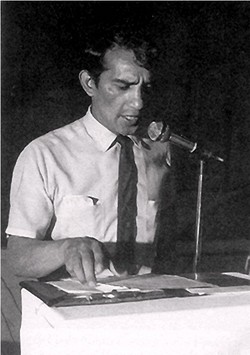Mr. Castro was not a traditional anti-war activist. He dropped out of high school to enlist in the Navy, and he dedicated much of his life to fighting for veterans' rights.
Ray was a lifelong resident of Our Lady of Guadalupe parish, a heavily Mexican South Chicago parish that reportedly lost more parishioners in Vietnam than any other Catholic parish in America.
Ray, who was instrumental in erecting a monument to those soldiers in 1970, praying for peace in Iraq was another way of helping a community he spent much of his life serving.
Born in 1934, he was raised in South Chicago, one of 17 children of Mexican immigrants John and Juana Castro. Following the lead of his older brother, Peter, an Army soldier, Mr. Castro quit high school to join the Navy, serving aboard the heavy cruiser USS Albany during the Korean War.
While supervising a game in the mid 1960s, Mr. Castro was approached by a city employee with the Model Cities program, the federally funded anti-poverty initiative enacted by President Lyndon B. Johnson. Mr. Castro was offered and readily accepted a position as a social worker in the city's Department of Human Services.
As a social worker, Mr. Castro began skirting the edges of local and national Democratic politics, working on U.S. Sen. Robert Kennedy's campaign for president in 1968.
Fed up with bureaucratic red tape and the lack of Hispanic representation in local and state government, Mr. Castro ran for Democratic committeeman of the 7th Ward in 1980.
He was elected, unseating incumbent Joseph Bertrand and becoming the first Hispanic to serve in that position in Illinois.
Ray saw his governmental role as an extension of his community service, not only ensuring that people had basic city services, but helping laid-off residents find jobs or safe after-school activities for their children.
Ray ran for 7th Ward alderman in 1983 but was defeated by William Beavers, who unseated him as committeeman the following year.
In 2000, he helped organize a 30th anniversary commemoration of the Our Lady of Guadalupe Vietnam memorial, and at the time of his death, he was researching the role of South Chicagoans in World War II and the Korean War. "He always felt that Mexican-American veterans did not get their due, and it was his passion to ensure that our contribution to the nation was recognized."
Ray died Wednesday of lung cancer. Besides Martin, survivors include five other sons, Luis, Nicholas, Raymond, Carlos and Juan; two daughters, Susan Rangel and Stephanie Castro; four grandchildren; seven sisters, Mary Ryan, Concepcion Vela, Carmen Cortes, Theresa Beas, Guadalupe Esteviz, Socorro Espinoza, and Esther Quiroz; six brothers, Leonard, Steve, Henry and Joe Castro, and Peter and Jesse Sandoval.
Mr. Castro was not a traditional anti-war activist. He dropped out of high school to enlist in the Navy, and he dedicated much of his life to fighting for veterans' rights.
Ray was a lifelong resident of Our Lady of Guadalupe parish, a heavily Mexican South Chicago parish that reportedly lost more parishioners in Vietnam than any other Catholic parish in America.
Ray, who was instrumental in erecting a monument to those soldiers in 1970, praying for peace in Iraq was another way of helping a community he spent much of his life serving.
Born in 1934, he was raised in South Chicago, one of 17 children of Mexican immigrants John and Juana Castro. Following the lead of his older brother, Peter, an Army soldier, Mr. Castro quit high school to join the Navy, serving aboard the heavy cruiser USS Albany during the Korean War.
While supervising a game in the mid 1960s, Mr. Castro was approached by a city employee with the Model Cities program, the federally funded anti-poverty initiative enacted by President Lyndon B. Johnson. Mr. Castro was offered and readily accepted a position as a social worker in the city's Department of Human Services.
As a social worker, Mr. Castro began skirting the edges of local and national Democratic politics, working on U.S. Sen. Robert Kennedy's campaign for president in 1968.
Fed up with bureaucratic red tape and the lack of Hispanic representation in local and state government, Mr. Castro ran for Democratic committeeman of the 7th Ward in 1980.
He was elected, unseating incumbent Joseph Bertrand and becoming the first Hispanic to serve in that position in Illinois.
Ray saw his governmental role as an extension of his community service, not only ensuring that people had basic city services, but helping laid-off residents find jobs or safe after-school activities for their children.
Ray ran for 7th Ward alderman in 1983 but was defeated by William Beavers, who unseated him as committeeman the following year.
In 2000, he helped organize a 30th anniversary commemoration of the Our Lady of Guadalupe Vietnam memorial, and at the time of his death, he was researching the role of South Chicagoans in World War II and the Korean War. "He always felt that Mexican-American veterans did not get their due, and it was his passion to ensure that our contribution to the nation was recognized."
Ray died Wednesday of lung cancer. Besides Martin, survivors include five other sons, Luis, Nicholas, Raymond, Carlos and Juan; two daughters, Susan Rangel and Stephanie Castro; four grandchildren; seven sisters, Mary Ryan, Concepcion Vela, Carmen Cortes, Theresa Beas, Guadalupe Esteviz, Socorro Espinoza, and Esther Quiroz; six brothers, Leonard, Steve, Henry and Joe Castro, and Peter and Jesse Sandoval.
Bio by: Scott McManimen


